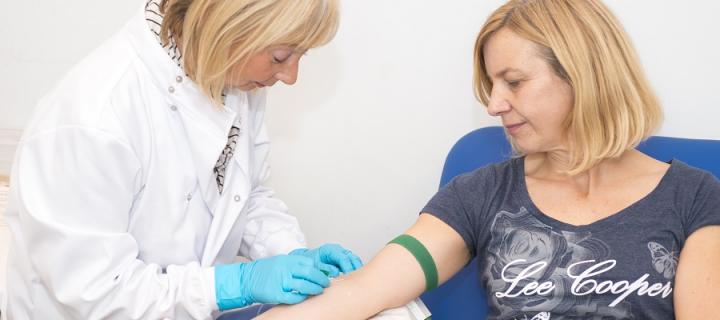Case Studies
Striking success stories have emerged from our drug discovery research.

Discovery and Development of a Phase 2 Ready Medicine to Treat Alzheimer's Disease
With University of Edinburgh co-investigators Prof Brian Walker and Prof Jonathan Seckl, we led an extensive drug discovery programme leading to the identification of UE2343 as a clinical development candidate for the treatment of Alzheimer’s disease. Funding for the programme was provided by the Wellcome Trust Seeding Drug Discovery initiative with full management of the programme directed by the Edinburgh team. All funding milestones were met and first time in human (Phase 1) clinical studies completed. The drug is well tolerated and displays high target engagement with a single oral dose. UE2343 was licensed to Actinogen Medical in 2014, where it has been re-branded as XanamemTM, and is progressing towards Phase 2 trials in targeted patient groups.
Get the full story about UE2343 on the Wellcome Trust website.
Read about Corticrine Ltd's acquisition by Actinogen Medical.
Learn more about Actinogen Medical by visiting their website.
Developing a Medicine to Treat Acute Pancreatitis
Acute pancreatitis can be a devastating condition for which there is no current therapy. In collaboration with consultant surgeon Mr Damian Mole, we initiated a drug discovery programme with MRC DPFS funding. Our team developed a series of screens, which led to the identification of multiple series of small molecule inhibitors for the target enzyme. On the basis of this work we entered a collaborative alliance with the GSK DPAc team to develop an intravenous medicine. The Edinburgh team has been responsible for target screening and the provision of pharmacodynamics and efficacy models.
Read the full case study on Edinburgh Bioquarter's website.
Read about our industry collaboration with GSK to treat Acute Pancreatitis
Developing a New Regenerative Therapy Target for Treatment of Multiple Sclerosis
There are currently no effective therapies to halt or reverse the effects of myelin degeneration in MS. Together with Dr Anna Williams (University of Edinburgh’s Centre for Regenerative Medicine) we are working with Sanofi-Genzyme to identify inhibitors of a novel therapeutic target.
Read the story in full on Edinburgh Bioquarter's website.
Development of a Best-in-Class Src Inhibitor for Treatment of Breast Cancer Metastasis
We have discovered the first drug candidate (named eCF506) that inhibits Src activity at subnanomolar concentration (IC50 < 0.5 nM) with very high selectivity over Abl kinase: an unprecedented difference of 3 orders of magnitude. The potent and selective properties of this inhibitor are important for two reasons: firstly, because its primary target SRC is upregulated in many cancers, including breast and colorectal cancer, and it is associated with poor prognosis, metastasis and chemoresistance mechanisms; and secondly, because all current Src kinase inhibitors either in the clinic (dasatanib) or under clinical development (saracatinib) are indeed dual Abl/Src inhibitors. This is of relevance because the manifestation of cardiac events - especially in elderly patients - is a well-established adverse effect of Abl inhibition and many studies indicate that Abl plays a paradoxical anti-oncogenic role in breast cancer. Such off-target activities would be absent in eCF506, thus representing the first drug candidate with the potential to enter the clinic for cancer therapy (e.g. treatment of metastatic breast cancer) without the liabilities of current Src/Abl inhibitors. Thorough assessment of eCF506, including broad kinome panel screening, ATP-competitive binding assays, screening of hERG channel and CYP induction liabilities, and in vitro and in vivo PK / PD assays, indicates that eCF506 is a Src-targeting drug candidate with improved properties over dasatinib (current gold standard Src inhibitor in the clinic). eCF506 can be regarded as the first drug candidate of a second generation of Src inhibitors that do not target the Abl kinase. The strategy applied to develop eCF506 is also one of the novel aspects of this work and is of major significance with regards to improving the efficiency of the drug discovery process, since it was developed at a fraction of the cost and time required for most drug discovery campaigns.
Development of a First-in-Class Focal Chemotherapy Approach for Treatment of Glioblastoma and Prostate Cancer
The highest life-threatening risks and therapeutic challenges still remain in developing effective treatment of patients diagnosed with locally advanced or metastatic tumours. To provide a safer and more effective strategy to localised cancers, we have developed an innovative therapeutic approach that allows concentrating drug activity only at the cancer area, thereby reducing the severe adverse effects associated with chemotherapy. The technology is based on a novel, patent-protected class of biochemically-stable prodrugs that are exclusively activated by palladium catalysis, thus enabling full control over where chemotherapy takes action through the use of palladium-functionalized devices. These biocompatible devices are safe to patients (palladium is already employed in dentistry) and can be inserted in the tumour by minor surgery. Systemically-administered drug precursors will only become “active” at the cancer site upon interaction with the palladium device. Given the catalytic nature (= reusability) of this device, prodrug treatments could be administered as many times as necessary. The unique modulatory capabilities of this novel approach can not only reduce drug presence in healthy organs but also facilitate personalized treatments to be implemented according to the progression and severity of the disease, thereby reducing side effects and maximizing the efficacy of the therapy.

